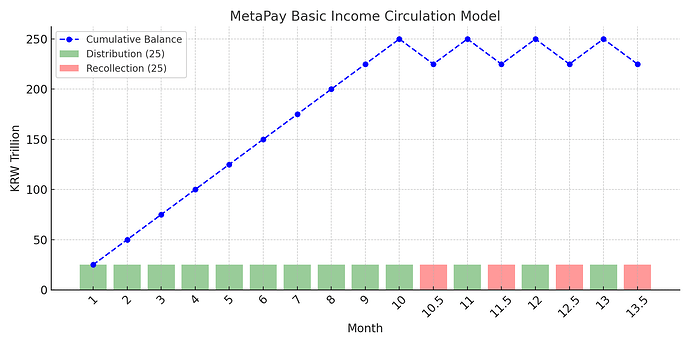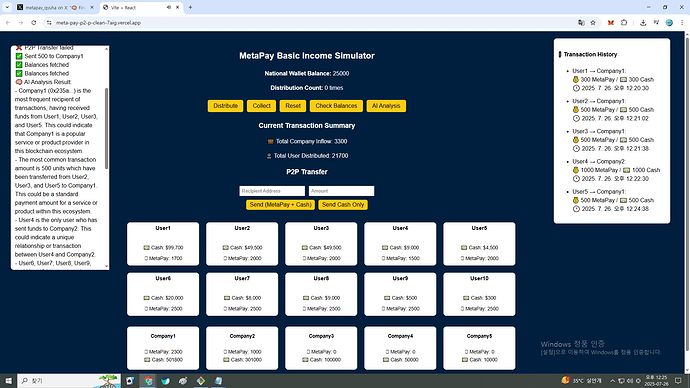![]() This submission is for the Bonus Track of the HyperHack Ideathon.
This submission is for the Bonus Track of the HyperHack Ideathon.
 Project Overview
Project Overview
Title: MetaPay – Circulating Basic Income Using Digital Currency
Main Submission: [HyperHack Submission] MetaPay – A Circular Basic Income Simulator on Web3
MetaPay proposes a fully electronic, self-replenishing universal basic income (UBI) system using digital currency.
The model distributes ₩500,000 monthly per person for 10 months and recollects 10% of wallet balances at the end of each cycle, creating a sustainable closed-loop financial system.
To enhance fairness, prevent Sybil attacks, and ensure that each person receives only one UBI wallet, MetaPay integrates Alith’s decentralized identity (DID) protocol.
 Alith Integration Highlights
Alith Integration Highlights
MetaPay uses Alith ZK-ID technology to:
 Verify wallet uniqueness: Every UBI wallet is tied to a verified digital identity.
Verify wallet uniqueness: Every UBI wallet is tied to a verified digital identity. Prevent abuse: Limits one MetaPay account per real individual by integrating DID logic.
Prevent abuse: Limits one MetaPay account per real individual by integrating DID logic. Ensure fairness: Everyone receives the same UBI payment without duplicate claims.
Ensure fairness: Everyone receives the same UBI payment without duplicate claims.
This approach guarantees that MetaPay remains a people-centered UBI system by excluding fake or mass-generated addresses.
 Technical Architecture
Technical Architecture
| Layer | Technology |
|---|---|
| DID Verification | Alith SDK (ZK-ID) |
| Wallet | React + Web3 + MetaPay UI |
| Smart Contract | Solidity (ERC20 variant) |
| Backend | Node.js + Express |
| Chain | Metis Sepolia Testnet |
![]() Integration Method:
Integration Method:
- Alith API is called at wallet sign-up.
- ZK-proof is required to complete wallet registration.
- Verified identity → Unique MetaPay wallet → Monthly UBI distribution.
 Demo & Repos
Demo & Repos
 Demo video: https://youtu.be/e4lH_uGN-ck
Demo video: https://youtu.be/e4lH_uGN-ck GitHub: GitHub - metapay-creator/MetaPay
GitHub: GitHub - metapay-creator/MetaPay Testnet dApp: https://meta-nv3jploud4-metapaygyuhas-projects.vercel.app
Testnet dApp: https://meta-nv3jploud4-metapaygyuhas-projects.vercel.app
 Impact of Integration
Impact of Integration
- No duplicate accounts → trustable UBI system
- No need for manual ID review → scalable deployment
- Transparent, privacy-preserving identity layer
Alith makes MetaPay more robust, scalable, and reliable for real-world adoption.
MetaPay is more than just a system for distributing money.
Its fundamental purpose is the restoration of time—and through it, freedom.
We believe that when people are no longer bound solely by the demands of survival, they gain the power to shape their own futures.
While countries like South Korea can implement MetaPay using national ID systems, the model is also adaptable to other contexts through ZK-ID (Zero-Knowledge Identity) authentication, ensuring fairness and privacy even without centralized identity infrastructures.
Through this hackathon, I look forward to working with technical experts to refine and prototype the system.
We are not simply sharing money—we are sharing the right to choose how to live.
Closing (updated)
MetaPay isn’t just a UBI project.
It’s a system designed to give time and freedom back to people through a digitally controlled, fair income cycle.
Thanks to Alith, MetaPay achieves the transparency and trust that true universal income needs.
![]() Main submission (updated): MetaPayP2P – Circulating Basic Income Simulation with AI & Peer Transfers
Main submission (updated): MetaPayP2P – Circulating Basic Income Simulation with AI & Peer Transfers
![]() Backend API: https://metapay-openai-backend.onrender.com/
Backend API: https://metapay-openai-backend.onrender.com/
Thank you for your consideration.
– by Gyuha Yoon (윤규하) | Forum ID: metapay_gyuha

